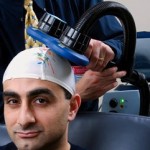
Transcranial Magnetic Stimulation (TMS) is a treatment where magnetic coils are placed above the scalp and used to generate magnetic fields, which create short-lasting electrical currents in the brain below the stimulation site. TMS is used to treat a number of health conditions including depression.
This meta-analysis conducted by researchers at Oxford University presents an up-to-date overview of randomised sham-controlled trials of TMS in the treatment of depression. The researchers searched Medline and Embase for studies where patients and investigators were blinded to treatment, and outcomes were measured using a version of the Hamilton Depression Rating Scale (or similar scale). They found 1,789 studies between 1996 and 2008 and included 31 with a total of 1,531 patients (815 receiving TMS and 716 receiving sham TMS courses).
Here are the results of the meta-analysis:
- Transcranial Magnetic Stimulation improved depressive symptoms more than the sham treatment (Random Effects Model Hedges’ g = 0.64, 95% confidence interval (95% CI) = 0.50-0.79, the Pooled Peto Odds Ratio for treatment response (≤50% reduction in depression scores) was 4.1 (95% CI = 2.9-5.9))
- The included studies showed significantly different results
- A meta-regression analysis did not highlight any predictors of treatment efficacy
- 9 studies included follow-up data (average 4.3 weeks), but there was no change in depression scores between the end of treatment and the follow-up assessment (Hedges’ g = -0.02, 95% CI = -0.22 to +0.18) and no heterogeneity in outcome
Transcranial Magnetic Stimulation (TMS) appears to be an effective treatment; however, at 4 weeks’ follow-up after TMS, there had been no further change in depression severity. Problems with finding a suitably blind and ineffective placebo condition may have confounded the published effect sizes. If the TMS effect is specific, only further large double-blind randomized controlled designs with systematic exploration of treatment and patient parameters will help to define optimum treatment indications and regimen.
Allan CL, Herrmann LL, Ebmeier KP. Transcranial magnetic stimulation in the management of mood disorders. Neuropsychobiology. 2011;64(3):163-9. Epub 2011 Jul 29. [PubMed abstract]

I felt really disorientated after I had an MRI of my head – I was dizzy for some time. I have also heard that people can be trained to use a magnetic orientation sense; that it is largely ignored but still resident in the brain (many creatures use the earth’s magnetic field for navigation). This suggests to me lots of new research angles on how this therapy works and how it may be related to other research on humans and magnetism – and even things like computer addiction and certain types of gambling addiction that involve gaming machines which may have a weak magnetic field contributing to the addictive effect. Feeling dizzy now: this might be due to the dyspraxia forum topic of dizziness (I was reading earlier on facebook) or due to too many tasks ideas and doubts topping up my inner to-do/sort bucket-list or thinking about the MRI or all of it. Even standing typing for too long at the laptop sitting above a piano with lots of wires to amplify the magnetic field or the suggestion of it? I certainly think the medical community and those interested and reporting on and using it need to be very careful and yet excited and gather more evidence. The therapy could potentially interfere in negative ways as well or have interactions with coordination disorders and certain therapies. I have a feeling that spatial awareness planning and executive functioning may be affected in positive or negative ways – just as emotions were supposed to be linked by evolution to our older systems for healthy and unhealthy situations and foodstuffs which is why odours are so evocative – if that is true- maybe there is another plank – our ability to map and plan our environment and our social environment – that is linked to our unconsciously utilised magnetic sense. TMS could work by resetting functionally confused neurological pathways by it’s overwhelming strength in a similar way to electro-convulsive therapy’s (ECT) supposed mechanism. The side effects of TMS could be unexpected and debilitating but take a while to expose if it knocks this sense out and this occasionally used reassuring ability to follow our nose isn’t there and sets up an anxiety loop in our sub-concious! But also revelatory and TMS’s use should spark lots of interesting research collaborations with those in the IT industry looking at electromagnetic sensitivity. But clearly it can help too! It may be that the sense of feeling ‘lost’ in depression and anxiety disorders is as apt as can be since we may have caused troubling somatic-anxiety associations and feedback loops linked in our deepest magnetic proprioception which our hind brain is aware of, and in some way this therapy resets.
There is an article with some interesting evidence on Electro-magnetic sensitivity here: http://www.bbc.co.uk/news/world-us-canada-14887428 The evidence reported fro Neuro-science looked interesting and worthwhile but the chest-pains as culmination of symptoms reported by one case study in the article suggest panic attack which emotionally loudly ticks the somatic symptom box. I believe the study evidence suggests it is likely genuinely an electromagnetic issue but also that anxiety has a large role to play. This is interesting generally. It probably also means that any TMS studies especially ones looking at which patient groups benefit for this therapy have to be controlled for environmental electromagnetic radiation exposure and sensitivity symptoms and other therapies which may have similar impacts such as ECT and magnetic bracelets.